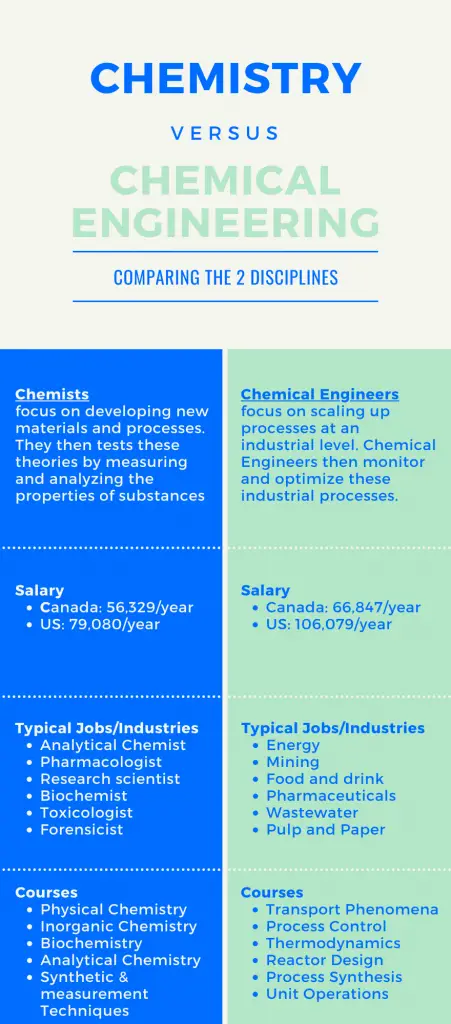
Chemical Engineer
Most people typically have an idea of what a Chemistry degree entails. After all, most of us have to take Chemistry classes at a high school level.
What I have found is a lot of confusion about how Chemical Engineers differ from Chemists. Most of the confusion typically surrounds the courses taken in school, the job responsibilities and the work environments they both function in.
This article will hopefully try to clear the confusion but also discuss the possibility of becoming a Chemical Engineer with a Chemistry degree.
The major distinction between a Chemistry and Chemical Engineering degree is in the number of Chemistry and Physics related courses offered by each program.
A typical undergraduate Chemistry program offers 7 times more credit for Chemistry courses whereas a Chemical Engineering program offers roughly 9 times more credit for Physics-related courses.

The Chemical Engineering program at The University of British Columbia only requires students to complete 3 chemistry courses: Chemistry for Engineers, Organic and Inorganic Chemistry. None Chemistry related courses include Transport Phenomena (Fluid Mechanics), Unit Operations, Process Control etc.
A B.Sc. in Chemistry at UBC would require undergraduates to complete courses like Coordination Chemistry, Spectroscopic Techniques in Organic Chemistry, Surface Chemistry and Surface Analysis etc.

Associate Professor of Teaching in Chemical and Biological Engineering at The University of British Columbia
There is overlap between chemical engineering and chemistry, but I would say chemical engineering focuses on using science, particularly chemistry, but also physics, math and biology, to create valuable products for society. Examples of some of these products would be clean water, fertilizer, energy systems and medication, to name only a few. Chemistry tends to focus more on understanding chemical systems rather than applying this understanding.
Chemists focus on developing new materials and processes, testing different theories by measuring and analyzing the properties of substances. On the other hand, Chemical Engineers focus on scaling up these processes at an industrial level, monitoring and optimizing them for yield, efficiency and sustainability.
The differences in courses also establishes the difference between the roles Chemists and Chemical Engineers perform in industry.
To understand a little bit more about the specific roles performed by Chemical Engineers in industry, I recommend this article. For a quick explainer, check out this video by our buddy Shawn Esquivel!
Chemists can be found in industrial facilities although they are situated mostly in laboratories performing routine and experimental testing. Chemical Engineers mostly work in these industrial plants interfacing directly with heavy process equipment such as pumps, evaporators, distillation columns etc.

With an average score of 1.5, based on the advice of a couple engineering recruiters, it is possible to work as a Chemical Engineer with a Chemistry degree in certain jobs but not probable.
Now that we understand the differences between Chemists and Chemical Engineers, we need to figure out if it is possible to get a Chemical Engineering job with just a Chemistry major and nothing else.
In order to answer this question, I reached out to 5 different engineering recruiters asking them to rate their likelihood of hiring a Chemist for the position of a Chemical Engineer on a scale of 1 to 10.
0 = Not possible to hire a chemistry major
10 = No preference between a chemistry major and a chemical engineer
Here are the responses I received.
Number | Comments | |
1 | 1-3 | It really depends totally on the company that is hiring. If they require someone to sign off on things as an engineer then they will require a designation. If it’s not required and the chemist experience is applicable to the job then it could definitely be considered. |
2 | 0 | You will need to have an engineering specific degree to be a chemical engineer and to eventually get your P.Eng. |
3 | 3 | This depends on the company, however most engineering jobs will require engineering degrees. However there are exceptions when a candidate has specific experience in that type of role |
4 | 2-3 | It is possible to work in a role that essentially mimics the work of a chemical engineer (i.e. equipment design, process monitoring and control, scale ups etc.), however is difficult to get the title of a chemical engineer |
5 | 0 | For EIT (Engineer-in-Training) development programs, the candidates come from a very narrow educational background of BSc. Applied Science, B. Eng, or Master’s programs. Those degree requirements were set to ensure the candidate was prepared for any of the different roles within the rotational program. In those programs, it’s 0 – not possible. |
Recruiter 2 and Recruiter 3 did however emphasize the possibility of being hired as a chemical engineer as a function of the company itself. So it is possible to have a company that has a loose description of what they require to be an engineer in their company. Recruiter 4 also discusses this idea of mimicking the work of a typical chemical engineer in some companies even if the title does not apply.
It is clear that trying to work as a Chemical Engineer with a Chemistry degree is not the most effective strategy if you want to ultimately work as a professional Chemical Engineer.
There is a big difference between having a degree vs just having the knowledge. The easiest and most tested method of landing a Chemical Engineering job is by having a Chemical Engineering degree.
However, if you want to stay with this strategy, here are some tips to increase your odds of eventually scoring that chemical engineering job
It is important to keep in mind that although these strategies will increase your odds for SOME jobs, they will do nothing for others (like we saw from the engineering recruiter responses).
Some companies are very stringent on their guidelines for recruiters in that they only want a person with a specific degree. These guidelines are generally due to the job having responsibilities that can only be fulfilled by a Professional Engineer (i.e. signing off on drawings).
Now if you are reading this and starting to realize that you want to study Chemical Engineering, alas there are ways to get there.
If you are just starting or in the middle of your Chemistry degree, check with your department about the possibility of transferring programs.
There are always ways to take all the prerequisites and necessary courses to make the transition. If you are nearing the end or completed your Chemistry degree, finish it and look into applying to a Masters in Chemical Engineering.
A 2-year Chemical Engineering Masters degree can quickly help you pivot and work as a Chemical Engineer in any industry.
Chemical Engineers focus on scaling novel processes industrially but also optimize existing large-scale processes for energy efficiency, yields. Chemists develop these novel processes using analytical methods and testing.
So can I become a chemical engineer with a chemistry degree if I wanted to as well?
The answer is it is possible but not probable. It is possible to work at a company as a chemist, understand the process and systems, shadow some engineers and then move into an engineering type role. It is also possible to find companies with loose descriptions of what they call “engineers”.
However, If you think that you want to work as a chemical engineer, the BEST strategy remains taking the proper steps to get a Chemical Engineering undergraduate degree or a Chemical Engineering masters degree.
3 Responses
Such a well-organized and informative article!
Chemistry within thermodynamics sounds interesting. My work is looking to hire a chemist. We want to experiment with biochemistry.
The purpose of this article is to help readers understand the key differences between chemistry and chemical engineering. Differences in emphasis, practicality, and potential professions are discussed. This article explains the differences between chemistry and chemical engineering and gives concrete examples to back up the author’s claims. Anyone curious about the similarities and differences between these two interconnected but distinct fields would find this article informative.